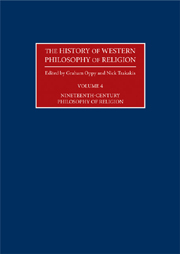Book contents
- Frontmatter
- Contents
- Editorial Introduction
- Contributors
- 1 Nineteenth-Century Philosophy of Religion: An Introduction
- 2 Johann Gottlieb Fichte
- 3 Friedrich Schleiermacher
- 4 G. W. F. Hegel
- 5 Friedrich Schelling
- 6 Arthur Schopenhauer
- 7 Auguste Comte
- 8 John Henry Newman
- 9 Ralph Waldo Emerson
- 10 Ludwig Feuerbach
- 11 John Stuart Mill
- 12 Charles Darwin
- 13 Søren Kierkegaard
- 14 Karl Marx and Friedrich Engels
- 15 Wilhelm Dilthey
- 16 Edward Caird
- 17 Charles S. Peirce
- 18 Friedrich Nietzsche
- 19 Josiah Royce
- 20 Sigmund Freud
- 21 Émile Durkheim
- Chronology
- Bibliography
- Index
4 - G. W. F. Hegel
- Frontmatter
- Contents
- Editorial Introduction
- Contributors
- 1 Nineteenth-Century Philosophy of Religion: An Introduction
- 2 Johann Gottlieb Fichte
- 3 Friedrich Schleiermacher
- 4 G. W. F. Hegel
- 5 Friedrich Schelling
- 6 Arthur Schopenhauer
- 7 Auguste Comte
- 8 John Henry Newman
- 9 Ralph Waldo Emerson
- 10 Ludwig Feuerbach
- 11 John Stuart Mill
- 12 Charles Darwin
- 13 Søren Kierkegaard
- 14 Karl Marx and Friedrich Engels
- 15 Wilhelm Dilthey
- 16 Edward Caird
- 17 Charles S. Peirce
- 18 Friedrich Nietzsche
- 19 Josiah Royce
- 20 Sigmund Freud
- 21 Émile Durkheim
- Chronology
- Bibliography
- Index
Summary
It is said that reading her husband's posthumously published lectures on the philosophy of religion had caused the devout and pious widow, Marie Hegel, considerable distress (Pinkard 2000: 577). How could the man she knew to have been a good Lutheran express the heretical views that were to be found there? This anecdote captures well the apparent ambiguity that marked the attitude to religion of Georg Wilhelm Friedrich Hegel (1770–1831), an ambiguity that was at the heart of the undoing of the ‘Hegelianism’ of his followers in the years after his death.
As is well known, after Hegel's death in 1831, his followers soon split into ‘Left’ and ‘Right’ factions, and while this split is now remembered in terms of its political consequences (it was from the Left Hegelian faction that the doctrine of Marxism was eventually to emerge), the context of the split was a religious one. A contest over the properly ‘Hegelian’ philosophical attitude to religion had been sparked by the publication in 1835–6 of David Strauss' The Life of Jesus Critically Examined. While the conservative Right defended Hegelianism as a philosophy that reflected Christian orthodoxy, the Left came to see it as a humanistic doctrine of the historical emancipation of humanity. However, while this was the first internal breach of Hegelianism, the implications of Hegel's philosophy for religious belief had been contentious since his rise to prominence in the 1820s.
- Type
- Chapter
- Information
- The History of Western Philosophy of Religion , pp. 49 - 60Publisher: Acumen PublishingPrint publication year: 2009



